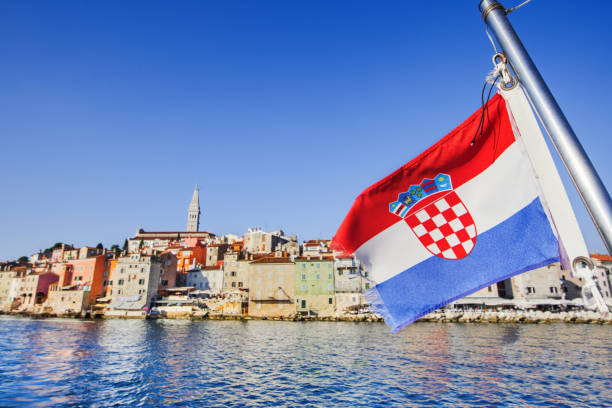Geography
Croatia is situated in Southeast Europe, bordered by Slovenia to the northwest, Hungary to the northeast, Serbia to the east, Bosnia and Herzegovina to the southeast, and Montenegro to the southeast. It has a long coastline along the Adriatic Sea, featuring over a thousand islands and islets. The country's terrain is diverse, encompassing flat plains, low mountains, and highlands.
History
Early History
The region now known as Croatia has been inhabited since the Paleolithic era. In the 7th century, Slavic tribes settled in the area, forming the basis of the Croatian nation.
Medieval Period
In the 9th century, Croatia became a kingdom under King Tomislav. By the 12th century, it entered a personal union with Hungary, maintaining a degree of autonomy.
Modern Era
After World War I, Croatia became part of the Kingdom of Serbs, Croats, and Slovenes, later known as Yugoslavia. Following the dissolution of Yugoslavia in the early 1990s, Croatia declared independence in 1991, leading to the Croatian War of Independence.
Politics
Croatia is a parliamentary republic. The President serves as the head of state, while the Prime Minister is the head of government. The Parliament, known as the Sabor, is a unicameral legislative body.
Economy
Croatia has a mixed economy, with tourism playing a significant role, especially along the Adriatic coast. Other important sectors include shipbuilding, pharmaceuticals, and information technology.
Culture
Croatia boasts a rich cultural heritage, with influences from various civilizations, including Roman, Byzantine, and Austro-Hungarian. The country is known for its traditional music, dance, and cuisine.
Recent Developments
European Union Membership
Croatia joined the European Union in 2013. In January 2023, it adopted the euro as its official currency and joined the Schengen Area, allowing for passport-free travel within participating countries. AP News
Defense Spending
In April 2025, Croatia announced plans to increase its defense spending to 2.5% of GDP by 2027 and to 3% by 2030, aligning with NATO goals. Reuters
Political Landscape
In May 2024, Prime Minister Andrej Plenković secured re-election and formed a coalition with a far-right nationalist party, reflecting a broader trend of far-right influence in European governments. Financial Times
Tax Reforms
In September 2024, Croatia announced plans to shift its tax burden from individuals to property to address rising real estate prices and rents. The new legislation aims to make housing more accessible and is expected to come into force on January 1, 2025. Reuters
Military Parade
In July 2025, Croatia held a military parade in Zagreb to mark the 30th anniversary of its 1995 Operation Storm military victory, showcasing its transition to Western military technology and reinforcing its NATO and EU alignment. AP News
Anti-Government Protests
In February 2024, thousands of people rallied in Zagreb, accusing the ruling center-right party of corruption and demanding an immediate parliamentary election. The protest highlighted political tensions in the country. AP News
Demographics
Croatia has a population of approximately 3.8 million people. The majority are ethnic Croats, with minorities including Serbs, Bosniaks, and others. The official language is Croatian, and the predominant religion is Roman Catholicism.
Tourism
Tourism is a vital part of Croatia's economy, with visitors attracted to its historic cities like Dubrovnik and Split, as well as its numerous islands and national parks.
Education
Croatia has a well-developed education system, with compulsory education lasting eight years. The country has several universities, including the University of Zagreb, founded in 1669.
Sports
Sports play a significant role in Croatian culture. The national football team has achieved notable success, including reaching the World Cup final in 2018.
Infrastructure
Croatia has a well-developed infrastructure, including a network of highways and railways. The country has several international airports, with Zagreb Airport being the largest.
Environment
Croatia is known for its diverse natural landscapes, including the Plitvice Lakes National Park, a UNESCO World Heritage site. The country is committed to environmental conservation and sustainable tourism.
International Relations
As a member of the European Union and NATO, Croatia actively participates in international affairs. It maintains diplomatic relations with numerous countries and is involved in various international organizations.
Future Outlook
Croatia continues to develop its economy, infrastructure, and political institutions. Challenges include addressing demographic decline, enhancing economic competitiveness, and maintaining political stability.
